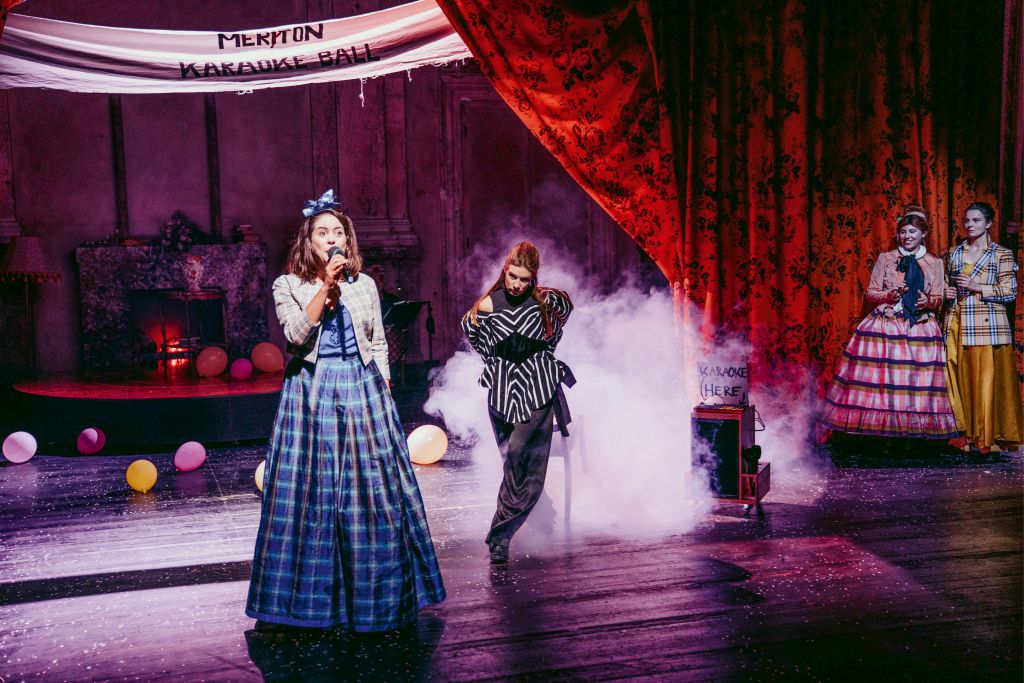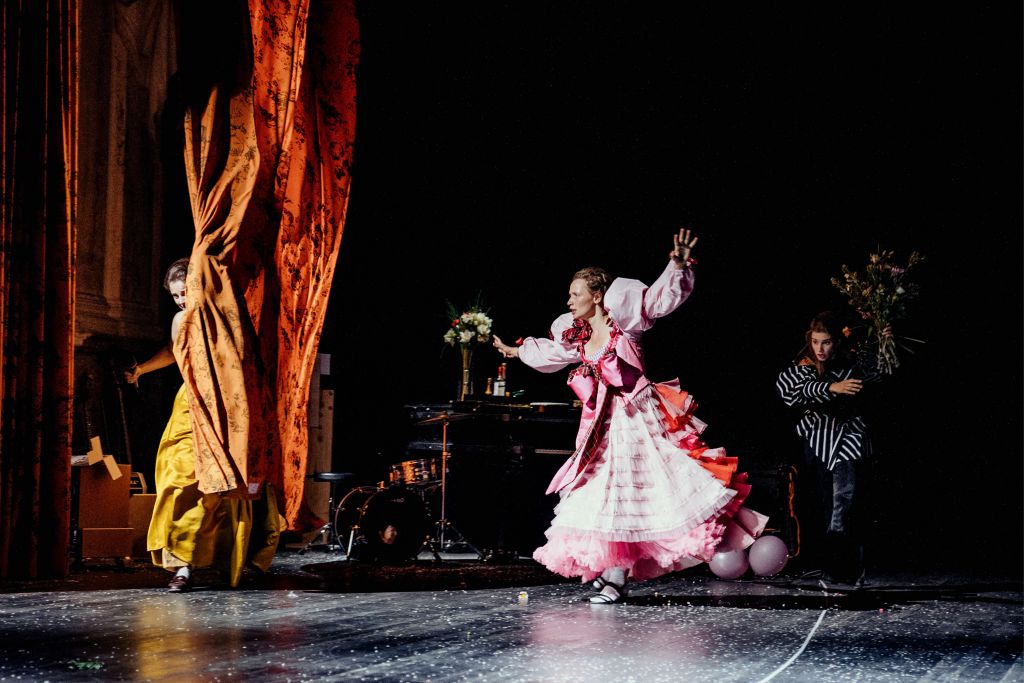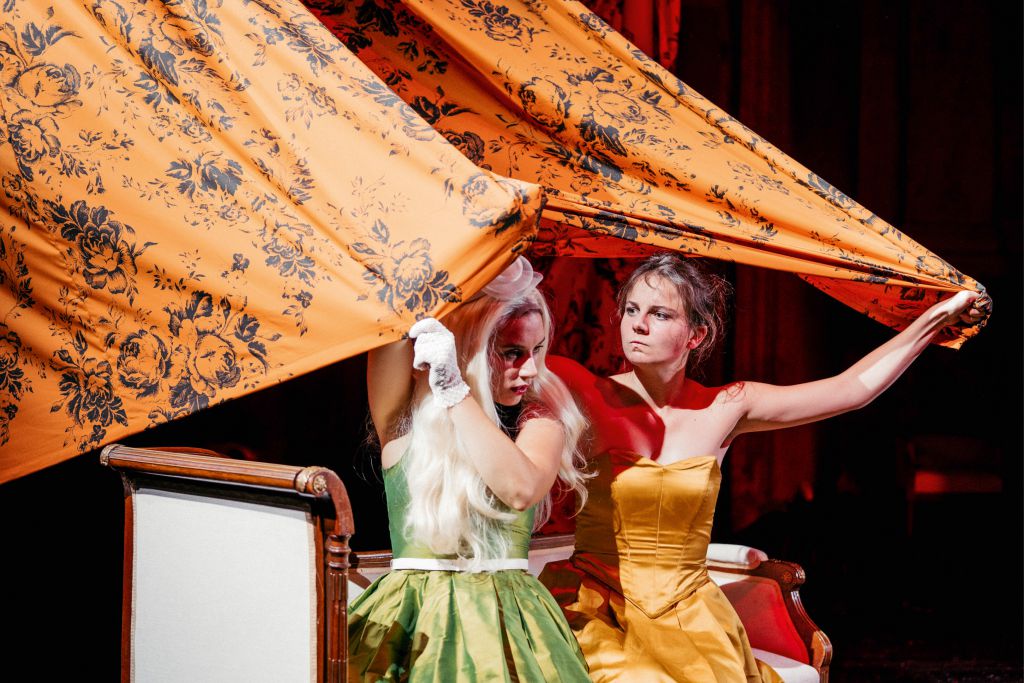Jane Austen Meets Karaoke
Jane Austen and karaoke – an unusual combination? Indeed. And an extremely compelling one, at that. With Pride and Prejudice* (*sort of) [German title: Stolz und Vorurteil* (*oder so)], British author Isobel McArthur recently created a refreshing adaptation of Jane Austen’s world-famous novel for the stage in which five women give their all—in numerous roles, interspersed with musical performances, and with those sharp-witted Austen dialogues. Max Reinhardt Seminar students Caroline Baas, Johanna Mahaffy, Maya Unger, Lili Winderlich, and Wiebke Yervis, directed by London native Lily Sykes, sweep up the audience in the protagonists’ turbulent love lives coloured by the pressure to which early 19th-century society subjected women. mdw-Magazin spoke with director Lily Sykes and actor Wiebke Yervis.

“When I was a girl, Pride and Prejudice was my hands down favourite novel—and I’ve always wanted to do it onstage,” says Lily Sykes. It was thus that she suggested Isobel McArthur’s successful adaptation for this cooperative project between the Max Seminar and the Burgtheater. The novel Pride and Prejudice, published in 1813, is about the wealthy Bennett family’s five daughters. The most important thing in their lives is supposed to be marriage to a wealthy man of high social status. After all, if their father were to die and the Bennett daughters still be unmarried, they would have nothing—since, legally, estates are only inherited via the male line. “No other female author had her eyes so uniquely trained on economic conditions and private relationships in society at that time as did Jane Austen,” says Lily Sykes.

In Isobel McArthur’s play, all of the roles are embodied by five young female actors while the plot is narrated from the perspective of the Bennett household’s maid. And though the servants know everything about their employers’ lives, they themselves have no chance of realising their (romantic) dreams. Here, the challenge for the actors is without doubt their roles’ numerousness and disparateness. Each actor plays between two and five characters—male and female, and of different ages. Roles are switched at a breakneck pace, which entails frequent costume changes and the generous employment of props. A big question in terms of role work was how to play the male characters. On this, Lily Sykes offers the following: “What makes a male character male is less about posture or physicality and more about the way in which a man takes his place in room as if it goes without saying, while a woman doesn’t do so with quite the same matter-of-factness.” Wiebke Yervis describes her work with the director as quite varied: “A two-day clown workshop before our rehearsals began gave us an idea of what those rehearsals would involve—namely a whole lot of singing and improvisational games aimed at eliminating our fear of looking ridiculous.” The characters in the play experience individual fates that include numerous twists and turns, in the process of which they behave in ways that could be described as less than adroit. “The nice thing about this play is that these fantastic characters learn from their mistakes. Also, portraying vulnerability onstage in our perfection-obsessed world is something I find especially interesting,” explains Sykes. For the director, one advantage of working with acting students was their boundless enthusiasm about acting. “Working with these students was an inspiration for me. Their ambition and their enthusiasm lent their portrayals a huge degree of liveliness,” says Sykes. Of the rehearsals, Yervis says: “The work began unusually in that we performed the entire play once a week, even though we hadn’t gotten our lines memorised yet. That was like extreme sports: standing on stage for four hours with our lines projected onto the wall, and each of us just continuing on no matter what happened. Because of that, we had zero time to think; we just acted.”
This play gives these five actors the opportunity to make a lot of music—with karaoke singing and both solo and band performances featuring various instruments. ”The characters quite consciously use music whenever language doesn’t suffice to express what they feel,” explains Sykes. And Yervis adds: “This isn’t about musical perfection; it’s about showing what’s inside our characters.” Singing is an important component of the Max Reinhardt Seminar’s acting programme. ”Vocal instruction continues throughout the entire programme—which is important, since actors are now having to do more and more singing on stage,” says Yervis.

In this play, singing characters are sometimes interrupted by the other characters in absurd ways. Absurdity and comedy—special challenges for the director? “The most important and most difficult thing about this play is timing. The actors have to be lightning-fast and absolutely exact. It’s almost like a dance where the actors have to focus simultaneously on themselves and on their partners,” says Sykes. Perfectionist aspirations are deliberately avoided, here, since this production’s insane tempo entails that errors simply will take place—errors that, in turn, produce some comedy of their own. “This play is written in such a way that it can never go perfectly. It will always be the case that some costume change won’t work, a microphone will go dead, or a vase will get accidently smashed to pieces onstage. The great thing here is dealing with such mishaps and learning to use them as a group,” explains the acting student.

The currency of Austen’s material lies in its portrayal of the importance of money and social belonging (plus the associated “success”) on the so-called love and marriage market. “Money and class still determine whether and how relationships work in world that pretends this isn’t the case,” says Sykes. The social pressure to conform to norms that women experienced back then, along with the stigmatisation that came with trying to break out of their assigned roles, can be seen in the examples of characters such as Mary, who didn’t want to marry, and Elizabeth, who bluntly blurts out uncomfortable truths. And in present-day women’s lives, the degree of social pressure hasn’t decreased.” The feeling of being worth nothing is still conveyed to lots of women, and the idea that marriage is the foremost goal in a woman’s life still exists,” opines Sykes.
Thanks to the dedicated theatrical work by Lily Sykes and the scintillating performances by the five Reinhardt Seminar acting students, we gain insights into the lives of women in Austen’s day with relevant lessons for modern gender relations—all humorously and effectively staged at the Burgtheater’s Kasino am Schwarzenbergplatz venue.

